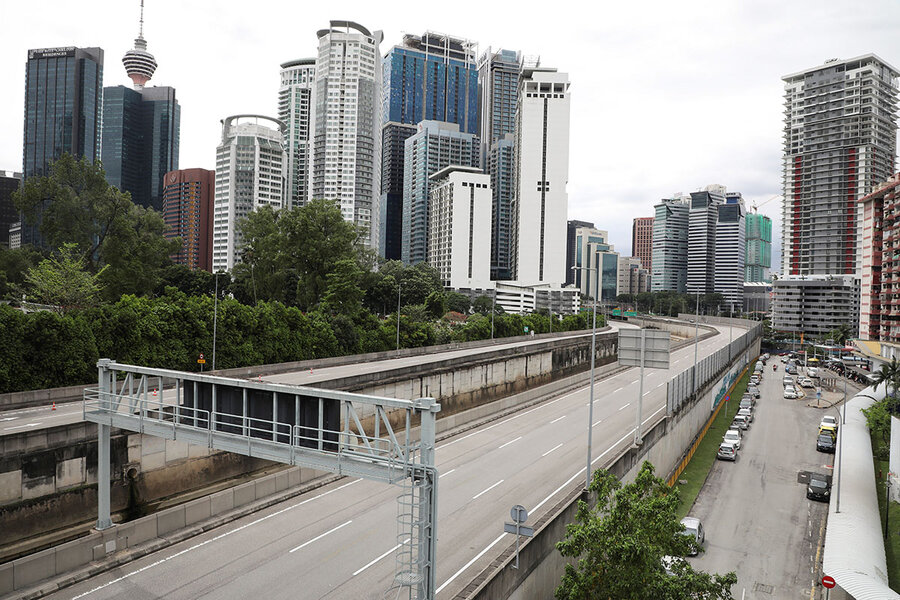Is Gardening a Crime? Malaysian city dwellers say no.
Kuala Lumpur, Malaysia
Amid the skyscrapers towering over the Malaysian capital, tiny community gardens are taking shape in a trend that has seen city dwellers claim the city – one plot at a time.
Using pockets of overgrown land under power lines or inactive shards by the riverside, community gardeners are busy digging, hoeing and weeding in a town best known for its glitzy malls and traffic jams.
But they face threats of eviction and legal insecurity, highlighting obstacles to access to community lands and fueling calls for authorities to relax the rules governing urban agriculture.
“We do not commit any crime,” said Ng Sek San, a landscape architect who founded Kebun-kebun Bangsar, a community garden in an affluent area of the capital that has been in existence since 2017.
The garden, on land under pylons, attracts a constant throng of visitors and weekend volunteers seeking respite from the sweltering city life, but last year it received an order to eviction after authorities withdrew a temporary lease.
“We have (…) to question discretion, when the law is unfair or not updated for our current urban life,” said Mr Ng, who continues to manage the garden despite the risk of five years in prison and 500,000 ringgits ($ 121,000) though, if the order is executed.
Other gardens that have struggled to get approvals have also called for legal reforms, to make it easier to access land for community use, especially in space-constrained towns.
Community gardens sprout and grow
Around the world, many cities have adopted urban agriculture to grow food locally and foster community, but residents say access to land is often hampered by high costs and stiff competition.
More than two-thirds of the world’s population are expected to live in cities by 2050, according to the United Nations.
The Food and Agriculture Organization of the United Nations (FAO) promotes urban agriculture as a means of ensuring food security in a context of rapid urbanization, while in rapidly aging countries like Singapore, it is also used to fight against the loneliness of the elderly.
Urban agriculture dates back to WWI in many countries, when people grew food in their homes or on public lands to avoid food shortages, a trend that continued into WWII. .
Home grown fruits and vegetables are common in rural Malaysia, but urban agriculture has only taken off in recent years, with some local councils endorsing it to promote a sustainable lifestyle.
With a population of around 7 million, the greater Kuala Lumpur region has seen the launch of at least eight community gardens in as many years.
Community gardens strengthen the sense of belonging in often fragmented urban communities, said Lee Jia Ping, co-founder of Tempatico, an urban rejuvenation consultancy.
“Cities can be very, very isolating,” Ms. Lee said.
“The great thing about these community gardens is that they are open to everyone. You need spaces where it’s open, and not just accessible to those who can afford it.
Most community gardens use government “reserve land” – unused land near power lines, riverbanks, or railroads deemed unsuitable for development projects – for agriculture.
It was not, however, easy.
Under current rules, urban agriculture projects need a temporary occupancy permit before they begin, according to the Federal Lands and Mines Office.
He ordered the eviction of Kebun-kebun Bangsar because he was “occupying government land without valid authorization” and after residents complained about the noise, the government agency said in a statement to the Thomson Reuters Foundation .
He did not respond to a question about the size of land approved for urban agriculture in the capital or about pending applications.
The government has recognized the need for an overhaul and even promised new guidelines to help facilitate urban agriculture.
The guidelines were expected last year, but the ministry in charge said it was “unable to provide answers” to their fate pending a cabinet decision.
Rogue gardeners
With no news on the reform, Malaysian businesswoman Phillipa Yoong and her neighbors simply stepped into their backyard, turned away as COVID-19 kept them close to their homes last year.
The group spent weeks last August clearing parts of an unused 1.5 acre lot under power lines, covered in weeds.
Even as the crops – brinjals, lady’s fingers and grasses – took root, the group still had not obtained approval to use the land, with land officials saying they were collecting opinions on a request that the community had filed last year.
“This is empty land that is wasted, I don’t like to see garbage, so why don’t we do something,” said Ms. Yoong, director of Kebun Komuniti Hartamas, a community garden in the Sri Hartamas neighborhood. .
“Yes [the authorities] Say ‘go’, let’s go. Until then, we just appreciate the participation and involvement of the community, ”Ms. Yoong said, adding that the project had cemented community ties in the pandemic.
In Kebun-kebun Bangsar – before Malaysia went into lockdown this month – children chased ducks and peacocks as volunteers tended vegetables, produce going to soup kitchens for the poor and refugees from Myanmar.
Founder Ng said he was optimistic about change, given communities’ growing backlash against rules they see as unfair.
“Land is an extremely expensive resource in the city center and a lot of people don’t have access to it, whether it’s just to walk in the park or to plant their own food,” he said.
“We have to recover some of our resources in the city. ”
This story was reported by the Thomson Reuters Foundation.

